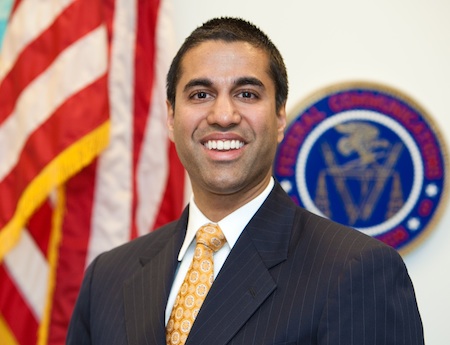FCC's Pai in Mumbai: U.S. Broadband, Video Have Formed Virtuous Cycle

The smarter way to stay on top of broadcasting and cable industry. Sign up below
You are now subscribed
Your newsletter sign-up was successful
"When it comes to content, I know what I like as a consumer. But as a regulator, I don’t believe that it is my place to impose my preferences upon others."
That was one of the messages of FCC commissioner Ajit Pai in Mumbai, India, speaking at a communications conference as the first Indian-American commissioner of the FCC.
Pai may have issues with the particulars of U.S. government communications regulatory policy, but in a speech to an international audience, he spoke in broad strokes about the success of U.S. policies that are based in promoting competition and spurring investment.
According to a prepared text, he told the FICCI FRAMES 2014 conference audience that in the U.S., broadband and video have formed a "virtuous cycle" with consumers' appetite for Internet video placing new demands on ISPs, and those broadband providers responding with billions of dollars in upgrades and new technical standards for faster data transmissions, while Google is providing 1 gigabit fiber.
Pai said that virtuous cycle was a result not of government fiat. "The government didn’t invent the iPhone. It didn’t launch Netflix. It didn’t install fiber to the home," he says. "It was private enterprise, taking risks to innovate and build, and competing for consumers in the free market, that brought about the digital revolution."
He said the key to U.S. communications policy has been a regulatory framework that removes regulatory barriers to infrastructure investment, creates a free market for spectrum, and embraces free trade and foreign investment.
He put in plug for a free and open Internet, as in free of micromanaging networks or content and free of heavy-handed telephone style economic regulations.
The smarter way to stay on top of broadcasting and cable industry. Sign up below
He also cited cable franchise video deregulation as another barrier to entry that had been removed by the government.
Pai promoted auctions free of "onerous conditions" on particular spectrum—a reference without reference to the proposal to put conditions on how much low-band spectrum AT&T or Verizon could bid on in the broadcast incentive auctions.
Reframing the degree of difficulty factor of those two-sided broadcast auctions for his local audience, Pai said it will be "more difficult to pull off than a Bollywood dance number."
Contributing editor John Eggerton has been an editor and/or writer on media regulation, legislation and policy for over four decades, including covering the FCC, FTC, Congress, the major media trade associations, and the federal courts. In addition to Multichannel News and Broadcasting + Cable, his work has appeared in Radio World, TV Technology, TV Fax, This Week in Consumer Electronics, Variety and the Encyclopedia Britannica.

